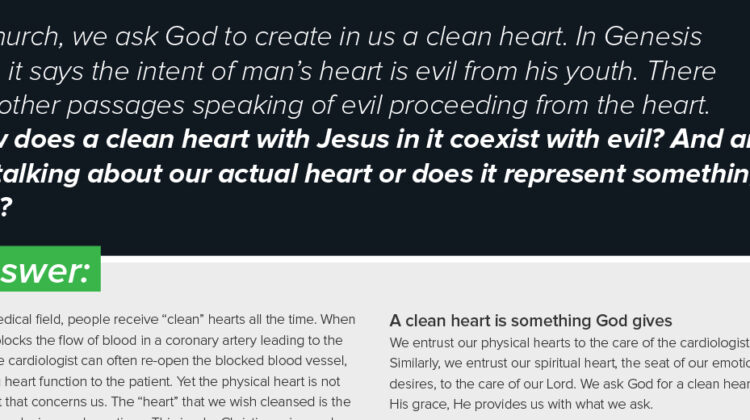
Question:
In church, we ask God to create in us a clean heart. In Genesis 8:21, it says the intent of man’s heart is evil from his youth. There are other passages speaking of evil proceeding from the heart. How does a clean heart with Jesus in it coexist with evil? And are we talking about our actual heart or does it represent something else?
Answer:
In the medical field, people receive “clean” hearts all the time. When plaque blocks the flow of blood in a coronary artery leading to the heart, the cardiologist can often re-open the blocked blood vessel, restoring heart function to the patient. Yet the physical heart is not the heart that concerns us. The “heart” that we wish cleansed is the seat of our desires and emotions. This is why Christians sing and pray these familiar words from Psalm 51, often as a response to the preached Word of God: Create in me a clean heart, O God, And renew a steadfast spirit within me (Psalm 51:10, NKJV).
King David composed Psalm 51 after he had committed adultery with Bathsheba. David had compounded his sin when he had Bathsheba’s husband killed in the field of battle. Eventually, the prophet Nathan confronted David with the judgment of God’s law. Realizing his fault, a repentant David confessed his sin, and Nathan assured David of the Lord’s forgiveness. In Psalm 51, David confesses his sin to God and prays that God would wash him clean and blot out all of his iniquities (Psalm 51:7, 9). Yet David wanted more than simply to be declared forgiven. David wanted to be a new man. He wanted God to create a clean heart for him and renew a steadfast spirit within him.
A clean heart is something we ask for
Like David, we regularly ask God for a clean heart. We ask because we must. Our hearts are filthy with sin. God sees that “the imagination of man’s heart is evil from his youth” (Genesis 8:21). Christ our Lord says, “For out of the heart proceed evil thoughts, murders, adulteries, fornications, thefts, false witness, blasphemies” (Matthew 15:19). Every true evil that exists in this world springs forth from the desires of the heart. And these desires are constant. Every intent of the human heart is only evil all the time (Genesis 6:5). Even our righteous deeds are filthy rags in the eyes of God (Isaiah 64:6) because we are sinful from birth, “brought forth in iniquity” and conceived in sin (Psalm 51:5).
Therefore, as the Book of Proverbs says, “Who can say, ‘I have made my heart clean, I am pure from my sin’?” (Proverbs 20:9). Nobody! We are incapable of cleansing our hearts. We might have more success performing heart surgery on ourselves than trying to cleanse our own hearts of sin!
A clean heart is something God gives
We entrust our physical hearts to the care of the cardiologist. Similarly, we entrust our spiritual heart, the seat of our emotions and desires, to the care of our Lord. We ask God for a clean heart, and in His grace, He provides us with what we ask.
God gave us a clean heart in the waters of Holy Baptism. Peter tells us that Baptism saves us with the guarantee of a good conscience before God (1 Peter 3:21). Through the promise of His grace, He sends the Holy Spirit to put a new heart and spirit within us (Ezekiel 36:26) that desires to live before Him in righteousness and holiness forever. Even Christ Himself dwells in our hearts by faith so that we grow in Christ’s love and in the fullness of God.
As long as we live on this earth, however, hearts that were once clean don’t necessarily stay that way. We are both saints and sinners at the same time: declared righteous and holy by God, cleansed in the blood of Christ, and yet still sinning every day. This life is a constant battle between our new life of faith in Christ that wants to please God and the evil desires that lurk in our hearts.
This is why God’s Word and the sacraments are so important. As we hear the Gospel of Jesus, and as we come to the altar and receive Jesus’ body and blood for the forgiveness of our sins, God sends us His Holy Spirit to cleanse our hearts once more and to uphold and strengthen us in our faith. In this way, our Lord restores the joy of salvation to us (Psalm 51:12) until the day He takes us home to be with Him in life everlasting.
Rev. S. Piet Van Kampen